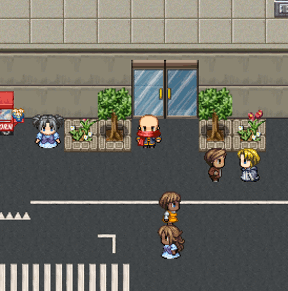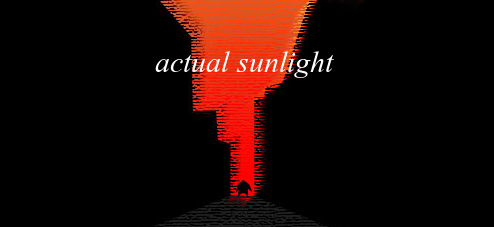Actual Sunlight
![]() Much like the gentle flapping of butterfly wings, our everyday decisions have unforeseen consequences that will catch up with us, for better or worse. Those very decisions could result in a happy life filled with incredible highs and sustainable lows or they could drown a person in hopelessness and unbearable misery. In Actual Sunlight, an indie adventure game by Will O'Neill, the key character Evan Winter is embroiled in the darkest of emotions and thoughts: suicidal ideations, self-loathing, loneliness, and severe depression. Told through extensive, self-deprecating narratives laced with sarcasm, Winters takes you down a dark path that will leave your emotions in a stranglehold.
Much like the gentle flapping of butterfly wings, our everyday decisions have unforeseen consequences that will catch up with us, for better or worse. Those very decisions could result in a happy life filled with incredible highs and sustainable lows or they could drown a person in hopelessness and unbearable misery. In Actual Sunlight, an indie adventure game by Will O'Neill, the key character Evan Winter is embroiled in the darkest of emotions and thoughts: suicidal ideations, self-loathing, loneliness, and severe depression. Told through extensive, self-deprecating narratives laced with sarcasm, Winters takes you down a dark path that will leave your emotions in a stranglehold.
 Despite the morbid overtone, the game still plays like your usual adventure where you guide your character with the [arrow] keys and tap the [spacebar] to interact with people or objects. The story unfolds through your discoveries, so to get the full effect of the game you'll want to talk with everyone and investigate every object. All of those discoveries give you a glimpse into the mind of Evan and the very real, very dark hole he's slowly sinking into.
Despite the morbid overtone, the game still plays like your usual adventure where you guide your character with the [arrow] keys and tap the [spacebar] to interact with people or objects. The story unfolds through your discoveries, so to get the full effect of the game you'll want to talk with everyone and investigate every object. All of those discoveries give you a glimpse into the mind of Evan and the very real, very dark hole he's slowly sinking into.
With such a bleak topic, modest interactive options, and a play through that won't be more than an hour, it would be easy to write this game off. Though brief, Actual Sunlight does something that few games are capable of doing: It traps you into the same feelings as the protagonist. The lack of decisions push you into that corner where you're forced to read the macabre thoughts that will inevitably make you pause and realize, oh no, some of this hits far too close to home. As the days pass for Evan you'll be hard-pressed to question why he feels the way he does. Instead you'll have anxiety twisting your gut knowing there's no happy ending but wishing, hoping desperately that there could be. This won't be the game that gets the best graphics award, it won't be the one that makes you feel accomplished for outwitting some puzzle. No, this is the game that once you're done playing you'll sit in front of your computer screen, take a deep breath, and question every choice you have ever made and all the ones that you haven't and that, more than anything else, is what sets this game apart from all the rest.
Due to the nature of the game and the mindset of the protagonist, the thoughts and conversations that occur are not going to be family friendly. You must also install the free RPG Maker VX RTP in to play Actual Sunlight.
![]() Windows:
Windows:
Get the free full version
![]() Mac OS X:
Mac OS X:
Not available.
Try Boot Camp or Parallels or CrossOver Games.






The credits of this game should be accompanied by Gotye's: "Eyes wide Open."
I know presentation is only a fragment of the fully experience of any narrative, but a cast of Fisher Price "Little People" in fanciful outfits kinda undermines a serious, earnest narrative in a pretty grave manner. The text-heavy linearity feels like this would have been better suited as a writing piece - having to scoot a bobbleheaded toy around between segments doesn't really aid the experience. Which is a shame, because I otherwise love this kind of story and style of narrative.
@Revvy
Perhaps it was the creator's intent to give the visuals of this Not Game a "cute" appearance. We see things in everyday life and we judge things based on how they look. Nothing is ever as it looks, for better or for worse. I feel that the creator wanted to give the impression of a cute exterior but we were privileged to look into the mind of someone on the brink of Chaos.
This experience is meant to be a rude awakening to anyone who has ever been in this position. I my self have been in this position once upon a time, I'm 27, a touch overweight, I was unemployed at one point and the world seemed to collapse in on itself but you know what?
I got through it. It does get better.
The visuals mean nothing in this game. If you judge it based on that then you have no business being here. go play your call of duty.
The reason this is also a "game" and not a written story is because it gives you the illusion of control as you join the protagonist through his endeavour.
I actually quite enjoyed the story, the writing, and the aversion of some of the cliches this topic gets hit with when tackled in fiction, but if you're insistent that someone can only have a single opinion on a single facet of a game, I guess I'll have to hate that too and go play some Call of Duty. Sorry. I'm not the one who made this rule. But apparently having an opinion on this one factor means I'm not allowed to think anything else.
As to the other side note: When the illusion of choice is seen through right from the starting line, it's not a very productive illusion.
The review made me really keen to play this game - which is pretty good - but I was left a little underwhelmed afterwards. It isn't in the same league as productions by FreeBirdGames, for example. I guess 'your mileage may vary'.
Things that worked:
* I liked the illusion of control. Games simulate real life, so having that illusion present in this story - which, after all, is really a statement about real life - is quite appropriate IMO.
* The quality of the writing is very good. The proofreading is also so good that I only spotted one typo (it was a duplicated "to" somewhere in the middle of the game).
* I loved the twist when you find out the patient transcripts are not what they seem!
Things that weren't so good:
* Side-plots and side-characters could have been a little more developed. The receptionist's story, for example, felt like it needed more exposition.
* The game dealt with the central issues of purpose and the pursuit of happiness, but I didn't find anything new to make me "question every choice [I] have ever made". This of course will depend on your own worldview. Mine lacks the certainty that the protagonist felt towards the end of the game - so I found it hard to empathise with his position.
* I felt also that the issues that the game raises are addressed quite well by existentialist ideas, particularly regarding how to deal with absurdity - again I did not really feel that the game opened my eyes to anything I hadn't considered before.
* In addition, there seems to be an inconsistency between the author's fourth-wall-breaking point about how you have the power to change your future path when you're young, and the premise of the game which is that the idea that you can be whatever you want is a big lie.
I didn't expect too much of this "game", but was curious and now it happened: I'm disappointed. I thought I at least would like to experience it, to "play" it, but now I don't. If all these boring and bad-written platitudes should simulate a real-life-experience, I just would say, they don't.
"Life is baaaaad! Decisions you maaaake. Oh, the hard liiiiife. But there is hooope, toooo. You're still yoooung. Be caaaareful, what you do affects yoooour fuuuuture!"
The beauty of life, nature, the truth behind the illusions, of course this doesn't matter.
If I want to spend time on this kind of subject, I prefer Allen Ginsberg's poems, which I find absolutely awful and mediocre, or read Nietzsche, who I think is just one of the lamest persons, that ever lived. So, I won't do that, and I will delete the game, without thinking about it anymore.
This is my reaction to this game. If anyone sees it differently, it's perfect for me and if anyone thinks, I missed the point of the game, I couldn't care less.
If you give this "game" a try, at least be prepared to read a lot, play very little, and what you read, seems to be the product of an 8 year old hobby-philosopher/psychologist. If it really was: Perfect! But it isn't, so it's just depressing, that someone with so little imagination creates a game.
Update